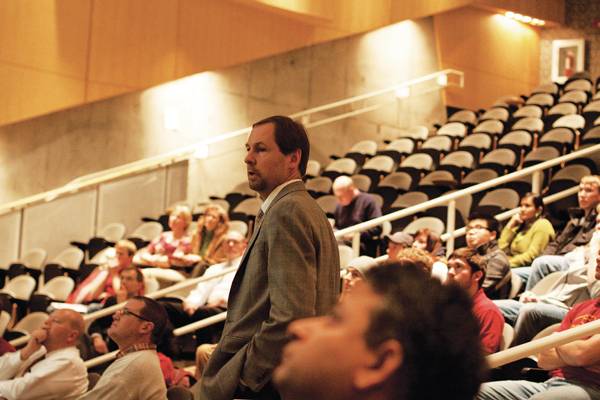Dean hosts town hall meeting

Jonathan Wickert, dean of the College of Engineering, held an open forum in Hoover Hall on Monday night, covering various issues and questions that students had about the college. Topics ranged from WebCT knowledge among teachers and budget cuts within the college to bettering certain teaching styles. Photo: Rebekka Brown/Iowa State Daily
February 15, 2010
Tell me what’s on your mind. That was the theme of the first ever Undergraduate Student Town Hall Meeting.
The meeting was an open forum hosted by Jonathan Wickert, dean of the College of Engineering.
Engineering administration and departmental chairpersons also attended the forum to help answer students’ questions and concerns, as well as gather feedback about how the students feel about their university education.
“Students are the most important part of the college. It’s the reason we come to work everyday,” Wickert said. “This is just part of my philosophy that I want students to be involved and informed.”
Topics of the forum included budget cuts, differential tuition, changes in the college’s teaching structure, possible improvements in evaluation policy and ideas for improving the quality of an engineering education at Iowa State. The discussion was organized by the Engineering Student Council.
Cody Lindemann and Shane Smith, both juniors in mechanical engineering, came to the forum because they had questions about differential tuition.
“What is the real justification [behind differential tuition]? How do you find us more expensive?” Smith said.
Smith’s question was answered by Diane Rover, associate dean for Academic and Student Affairs; Theodore Heindel, interim departmental chairman for mechanical engineering; Tom Rudolphi, interim departmental chairman for aerospace engineering; Arun Somani, departmental chairman for electrical and computer engineering; Surya Mallapragada, departmental chairwoman for chemical and biological cngineering; and Gary Mirka, departmental chairman for industrial and manufacturing systems engineering.
Each took turns with the microphone explaining how differential tuition had been used in their departments to increase the quality of their education.
“There was a pretty good analysis done a few years ago when it was approved and that was presented to the board. It comes down to looking at the cost of education,” Rover said. “Engineering has a higher cost of education.”
Some of this higher cost of education is due to lab equipment and engineering faculty salaries.
Engineering faculty get paid higher salaries compared to faculty in English or history.
Differential tuition is also used to keep the student faculty ratio relatively low. New faculty were hired in industrial and manufacturing systems engineering, aerospace engineering, chemical and biological engineering and mechanical engineering.
Part of the differential tuition gets allocated for scholarships, but Lindemann was concerned these scholarships were not being directed back toward juniors and seniors who were paying the tuition.
The 15 percent is above any of the scholarship program and it does get directly applied to juniors and seniors with need, Rover said.
Students also shared other concerns like the teaching quality of the faculty, different class structures and supplements to classes like podcasts and videos.
“For the most part, they answered my questions,” Smith said.
Wickert was happy with the turnout and gathered a lot of feedback from the students.
“You should have a big say in your education and this is a way for students to ask questions. Actually what I heard tonight was not so much asking questions, but offering ideas,” Wickert said.
This kind of informal gathering between the College of Engineering administration and engineering students has been a general theme throughout the school year.
In addition to this forum, Wickert also meets twice a month with students for brown bag lunches. He is also teaching a new class this semester in engineering leadership.
Another town hall meeting for graduate students will be at 5 p.m Thursday.
The meeting is taking place in Kent-Stein Foundation Auditorium Room, 2055 Hoover Hall.






